It wasn’t too long ago that Google officially sunsetted Universal Analytics (Google Analytics 3), in lieu of Google Analytics 4. Google Analytics 4 (GA4) is severely lacking in many functions that most SEOs previously used in day to day operations, especially when it comes to granular analytics of individual pages and traffic sources. It was simple to find which of your landing pages or blog articles are performing best in UA, but it isn’t so straightforward within GA4. It feels like you need a degree in GA4 just to get things done nowadays.
Hopefully one of these meets your needs and you can start tracking user engagement more effectively today.
Are there good alternatives to Google Analytics 4?
Despite its widespread use, Google Analytics has several shortcomings. It isn’t user-friendly, and it uses lots of specific terminology and jargon that may be unfamiliar to the average user. Although Google offers the Analytics Academy to assist you in learning how to use it, not everyone has the time or expertise to devote weeks to learn how to use the platform.
Where GA4 Falls Flat
Google Analytics 4 is disappointing to many SEO professionals, including myself. Just setting it up is a considerable challenge, requiring a thorough understanding of the new platform in order to modify it to meet UA’s functionality. On-page SEO became more difficult without being able to deep dive individual page performance and user journeys as easily.
Here’s a few key reasons why GA4 falls flat:
- Complex Interface: The new interface can be challenging to navigate, especially for users accustomed to the simplicity of UA.
- Steep Learning Curve: Transitioning from UA to GA4 requires significant time and effort to understand the new features and functionalities.
- Event-Based Tracking: While event-based tracking provides more flexibility, it can be overwhelming for those who are used to the pageview-based model in UA.
- Customization Requirements: GA4 often requires more customization to get the same level of detail available by default in UA.
- Reporting Changes: Many of the standard reports available in UA do not have direct equivalents in GA4, making it harder to find specific data quickly.
- Fewer Third-Party Integrations: Some third-party tools and plugins that worked seamlessly with UA are not yet fully compatible with GA4.
Choosing the Right Analytics Tool for Your Business
In our experience working with a wide variety of clients and business models, we’ve found there are 5 key criteria you should consider when selecting an analytics tool for your website:
- Privacy: How is data privacy handled and does it comply with regulations like GDPR?
- Ease of Use: Does it have a user-friendly interface and how straightforward is its implementation?
- Features: What features make it stand out from competitors?
- Cost: How is its pricing model structured and is it affordable for your business?
- Support and Community: Does it have an active user community? How responsive are they to support tickets and on social media?
5 of the Best Google Analytics 4 Alternatives
PostHog
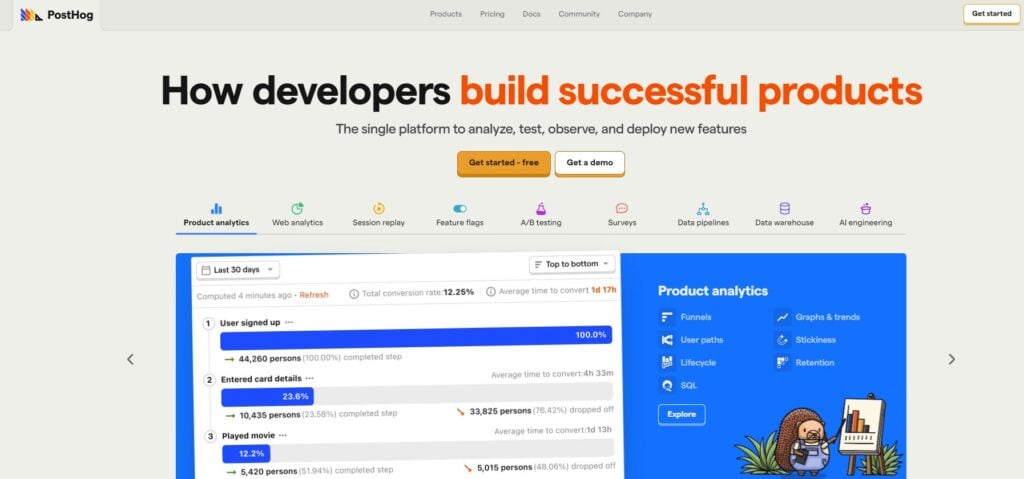
PostHog is an open-source, all-in-one analytics platform geared towards developers who want to get the most insights as possible from their users.
Features:
- Powerful analytics functions like A/B testing and user session recording
- 50+ integrations and an API that’s easy to use
- Very active community of users and staff for quick support
Privacy & Compliance:
It’s more privacy-conscious than Google Analytics and it’s not even a close comparison. PostHog doesn’t use your data for anything other than calculating your own insights and they don’t sell your data to anyone either.
They also have resources available for compliance with GDPR, HIPAA and CCPA.
Ease of Use:
Incredibly easy to set up and use; it’s simple to implement into your website or apps.
Pricing: PostHog starts at $0 per month, with your first 1 million analytics events free before switching to a usage-based pricing you can read about here. The best way to understand how much it will cost is to get started on the free plan so you have an idea of how many analytics events your website engagement brings in.
They also have special plans for startups who are under 2 years old and less than $5 million in funding, giving you $50k in credits for free.
Fathom Analytics
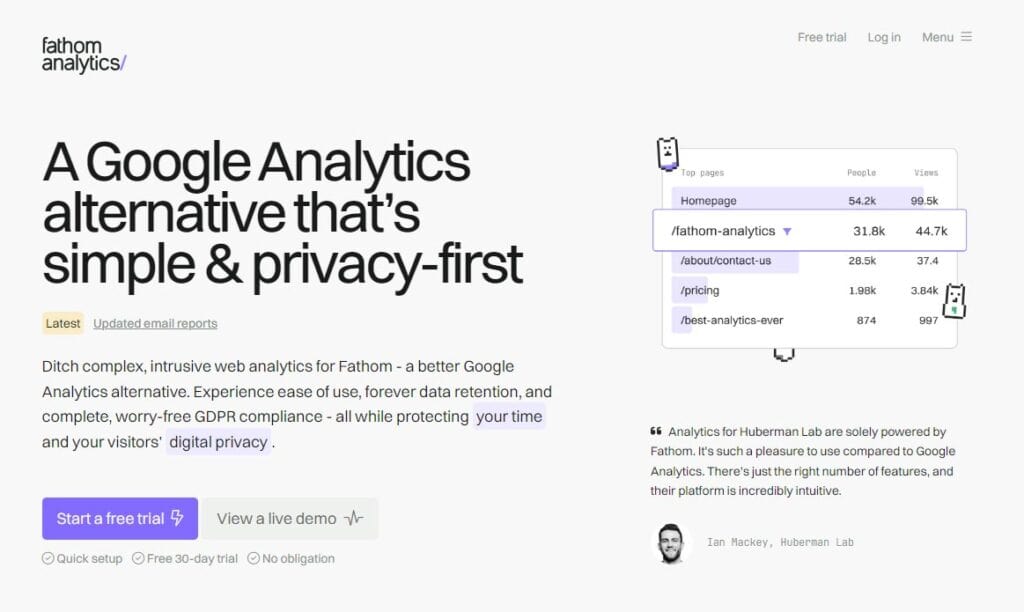
The entire premise of Fathom is that once installed, you can ditch Google Analytics altogether. And while that sounds like a bold claim, they actually execute on it well. You can get in-depth analytics without fluff, complexity or even training.
Features:
- Limited features with its privacy focus
- Easy learning curve, anyone can pick it up
Privacy & Compliance:
As a privacy-first platform, Fathom takes it seriously from the ground up with privacy law compliance including GDPR, CCPA, ePrivacy, PECR and more. It also collects zero personal data, making it a powerful tool for developers who want a fast-running website.
Ease of Use:
Fathom has an intuitive dashboard that any marketer can master effortlessly.
Setup is easy too. One line of code: That’s all you need to set up Fathom Analytics to any website, CMS or framework.
Pricing: Fathom has a free 30-day trial and paid plans start at $15 per month.
Plausible
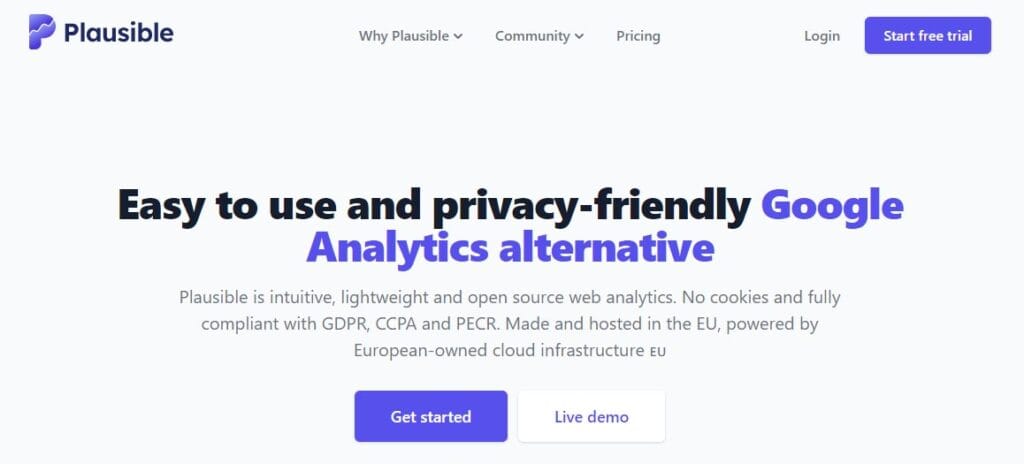
Plausible is similar to Fathom, where privacy comes first and it comes with a minimal approach to analytics that’s easy for anyone to use.
Features:
- Search Console integration and a real-time dashboard
- 45x smaller than Google Analytics, won’t slow your site down
- Track goal conversions, revenue and campaigns
Privacy & Compliance:
Plausible is a cookie-free, privacy-friendly Google Analytics alternative that’s fully compliant with GDPR, CCPA and PECR.
Ease of Use:
It does exactly what it claims to do and does it extremely well: Plausible is one of the easiest to use analytics platforms we’ve tried.
Pricing: Paid plans start at $9 per month and are based on your total pageviews.
Fueled.io
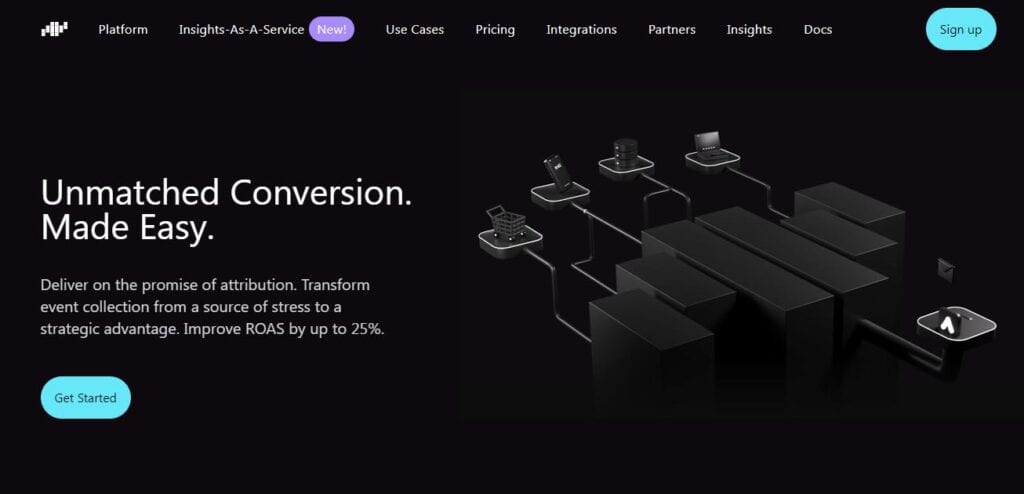
Fueled is a no-code analytics platform focused on eCommerce with easy implementation with Shopify, Bigcommerce and more. It makes it easy to collect 1st-party data to empower your marketing and sales efforts.
Features:
- eCommerce integrations
- Customer profile enrichment for in-depth actionable insights
- Customer journey analytics to better understand your audience
Privacy & Compliance:
Fueled is focused on allowing you to collect 1st-party data that you own outright. Unfortunately, I couldn’t find policies on their site anywhere about GDPR or other privacy law compliance.
Ease of Use:
Transitioning from GA4 to Fueled is seamless and fast to install for anyone on your team, not just developers. They also offer an onboarding concierge that can set things up for you.
Pricing: More pricey than others in this article, Fueled plans start at $189 per month.
Usermaven
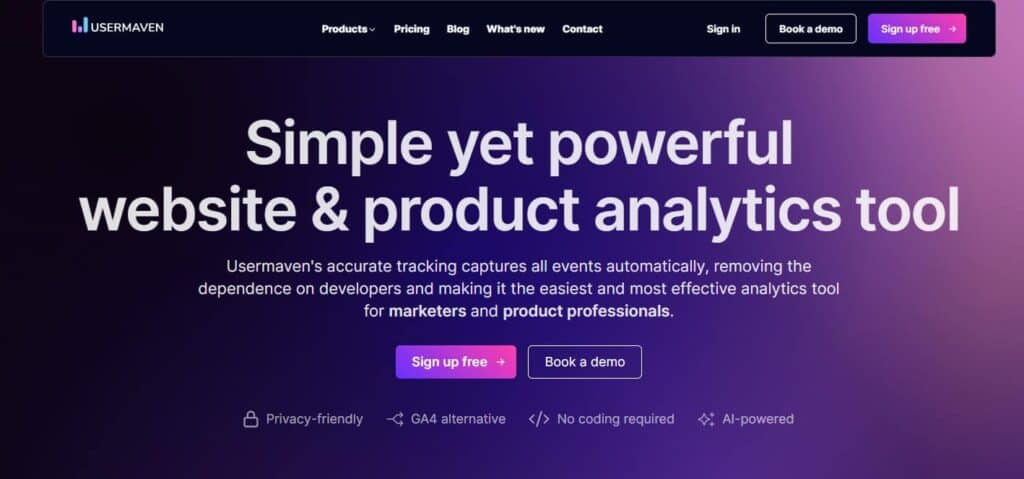
Uesrmaven might be the best Google Analytics alternative for SaaS companies, offering essential SaaS insights like which features are used most, friction points and identifying power users.
Features:
- Automatic event tracking without any coding needed
- Allows SaaS companies to optimise marketing channels for stronger ROI
Privacy & Compliance:
Usermaven is privacy-focused, with data ownership as well as GDPR and CCPA compliance.
Ease of Use:
Usermaven boasts its effortless, no-code event tracking, making it a strong choice if you want in-depth analytics beyond just the basics.
Pricing: Usermaven paid plans start at $14 per month.
Give Google Analytics Alternatives a Shot
Ditching Google Analytics for lighter weight, more privacy-focused alternatives is not only a smart move for optimising your website’s load speeds but also a responsible choice for safeguarding your visitors’ data.
By choosing solutions that prioritise user privacy, you can build trust with your audience while still gaining valuable insights to enhance your digital strategy.
Remember, the best analytics tool is one that aligns with your values and meets your specific needs without compromising on privacy. Make the switch now and see the difference it can make for your site performance and user engagement.






